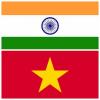"A (F)utile Intersessional Process? Strengthening the BWC by Defining Its Scope" (Authors: Cindy Vestergaard and Animesh Roul)
During its thirty-five years, the Biological Weapons Convention (BWC) has been scarred by treaty violations, failed compliance negotiations, and ambiguous treaty language. From 2003 to 2010, intersessional talks centered on less controversial topics in an attempt to save the treaty from spiraling political tensions.





